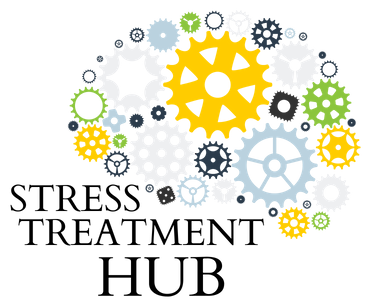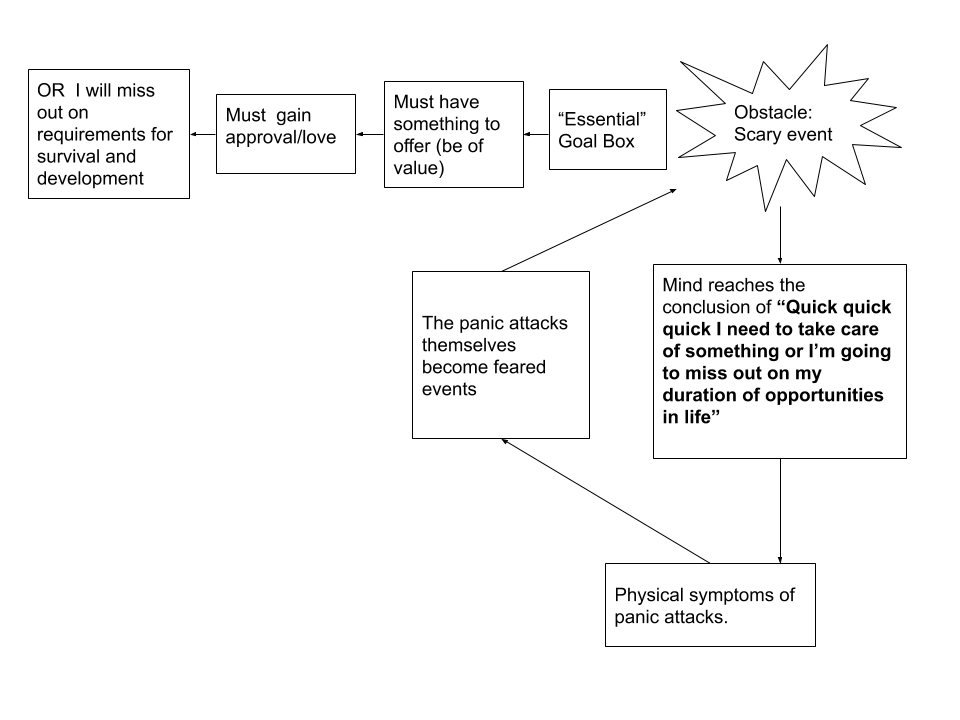THE CAUSE OF PANIC ATTACKS
Do you remember when you had your first panic attack?
For me it was when I was in my room, studying for my grade eleven exams. I remember anxious thoughts circling around my mind on an endless loop, each one screaming it’s message of danger. I remember lying on the floor and feeling like I was being smothered, unable to breathe. I remember waiting for the normal, rhythmic rise and fall of my breathing to return, and being shocked and scared by the thought it may never return. My life would not be the same after that. It seemed Pandora’s box had opened.
Panic attacks are more common that you might think – according to the Beyond Blue website up to 40% of the population will experience one in their lives. So you and I are not alone in experiencing them, and certainly not strange, weird or crazy. Persistant, recurring panic attacks are labelled as “panic disorder”.
Respiratory Symptoms
A panic attack is an extremely severe form of anxiety. In many cases of panic attacks, the respiratory system becomes very restricted, and doesn’t allow the lungs to fully expand and take in a full breath of air. All the muscles involved in breathing become tense and make shallow, rapid movements. This makes the person feel like they can’t breathe properly and are choking or being smothered.
Although it may feel to the person like they are not getting enough air, it is actually a case of over-breathing (hyperventilation) as the lungs are desperately gasping for air which is not required. This can produce all sorts of side effects such as lightheadedness, dizziness, tingling and numbness.
Like anxiety, panic also usually involves a rapid heartbeat, as the body attempts to direct resources to the organs and muscles needed for quick action in a fight or flight situation. There are many other symptoms associated with the fight or flight response, and there are many different variations of panic attacks. Your coach at Stress Treatment Hub will be able to work with you to isolate your individual symptoms and the psychological concerns which are fueling your panic attacks.
Here is a list of the physical symptoms people can experience during a panic attack.
- Palpitations, pounding heart, or accelerated heart rate
- Difficulty breathing (feeling that their is not enough air)
- Feeling like you are being suffocated/choked/smothered
- Feeling dizzy, unsteady, lightheaded, or faint.
- Numbness or tingling sensations
- Excessive perspiration
- Trembling or shaking
- Feelings of constriction or pain in the chest or neck
- Nausea or abdominal distress
- Dry mouth
- Chills or heat sensations
- Flushing and Blushing
- Excessive blinking
- Muscle tension
- Muscle spasms – face twitches,
- Excessive Swallowing
- Feelings of unreality and detachment from the environment
Thoughts
The beliefs behind panic are more extreme than those in anxiety. Anxiety occurs when a person’s mind believes there is a need to desperately attend to certain aspects of life in an effort to prevent particular unwanted situations from eventuating. These beliefs trigger the “fight or flight” response to a threat! In a panic attack, the person has come to the point of believing that threat is extremely severe, imminent and catastrophic! To their psyche, the threat has been elevated to the next level of severity, and also seems very likely to occur! This is an extreme state or terror and panic!
A panic attack feels even more desperate because the person not only believes they really need to attend to things to make sure nothing goes wrong (as in anxiety), but also believes they are about to miss out on receiving their life opportunities. This can mean a loss of developmental opportunities in life, or it can mean loss of duration of life (death). This is a full blown panic attack! Less severe panic (general feeling of breathlessness) can occur if the person is simply questioning in the back of their mind “will I or won’t I miss out on my opportunities?”
That is a feeling of impending death and doom. It is a fear of missing out on their time of life, the time when things are available for their development and survival. The person’s belief in the “chance of being restricted in the opportunity (restricted in receiving time) to work on the development of their life” has their psyche desperately wanting to make sure that time is being received to work on life. It is interesting to compare this concern to what often happens physically with the acceleration of breathing and the feeling of the respiratory system “closing off” as the lungs gasp for more air.
I understand the above description is not typically what you will hear when searching for panic attack information. If you find those descriptions confusing, consider the following summary of subconscious panic thoughts:
“QUICK QUICK QUICK, I’ve really got to take care of things or I’ll miss my chance to successfully live – I won’t survive”
Fear of death
Now you might think that a life threatening situation would be the only time a person would have thoughts like this. But anyone who has experienced panic disorder is living proof that that is not at all the case. Panic attacks are often described as the body’s alarm system making a mistake and generating a ‘false alarm’ in a completely safe situation. This is absolutely true, and an important part of recovery is your mind learning that it is not in danger during an attack.
However, we need to understand that the mind considers the loss of personal value and worthiness to be another way of dying. To have no value is to be dead. This explains why our mind’s ‘bodyguard’ (the amygdala) is constantly scanning events not just for threats to our physical safety, but threats to our self-worth.
Stage One
The person may have originally found themselves in a situation where they believed they missed out on their opportunity to develop their life. They may have viewed the situation as a lost opportunity, and believed that they must make sure as to prevent such a loss happening again. Whatever the events are, they have experienced some time in their life where they felt they really needed to take care of things so they didn’t miss their chance at life.
Stage Two
In stage two panic disorder, a person starts to view the panic attacks themselves as the scary event which could take away their chance to develop their life. They might view panic attacks as the factor which is restricting them from take advantage of all of life’s amazing opportunities. They might believe that panic attacks are displaying them to be a failure at life, and unable to psychologically cope. They might believe panic attacks display them to be weak, pathetic, stupid, cowardly, crazy etc. They may believe panic attacks are ruining their physical health, and ruining their life. They might believe panic attacks will ruin their chance at ever proving themselves worthy and valuable. They may even believe that the panic makes them unworthy to receive any opportunities. This is why panic attacks are so scary. The physical discomfort of panic symptoms alone is not enough to cause the extreme fear, it is more about what these panic symptoms mean to the mind. And to the panic sufferers mind – a panic attacks means it’s all over!


